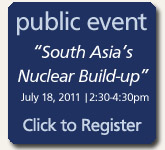USIP’s Moeed Yusuf discusses the tragic bombings in Mumbai, India – and why these sparked immediate international and regional concerns.
USIP’s Moeed Yusuf discusses the tragic bombings in Mumbai, India – and why these sparked immediate international and regional concerns.
- What do we know about the bombings in Mumbai?
- Even without a confirmation of who is responsible, why have these bombings immediately sparked regional – and international – concern?
- What is the mood in Pakistan in response to the tragedy?
- USIP hosted a major event on Pakistan and India as the first of a two part conference this week. What was learned about the importance of normalizing India-Pakistan relations? And why do U.S. policymakers pay close attention to this?
What do we know about the bombings in Mumbai?
Three improvised explosive devices (IEDs) went off near-simultaneously in different parts of the city of Mumbai, the scene of the November 2008 terrorist attacks which killed 166 people. As of Thursday morning, intelligence is still trickling in, but the initial suspicion coming from various quarters in India is that the Indian Mujahideen (IM) or the Students Islamic Movement of India (SIMI) is behind the attack.
No matter who is behind the attack though, this is simply not good for peace in South Asia. The dialogue process having just re-started between India and Pakistan following a prolonged hiatus since the 2008 Mumbai attacks, instability in India or any blame game between the two countries, if that comes, would be ruinous for progress towards peace in the region.
Even without a confirmation of who is responsible, why have these bombings immediately sparked regional – and international – concern?
It’s impossible for people not to immediately be reminded of the November 2008 attacks. The people of Mumbai still relive that memory, and because Pakistan-India relations hit rock bottom following the 2008 attacks, today’s events raise concerns again. There is also a history of cross-border militancy emanating from groups in Pakistan and thus, that is obviously going to be a concern. In the U.S., no one should underestimate the importance of India-Pakistan relations to U.S. interests in the region, and so this attack’s potential to destabilize one or both countries cannot but be of immediate concern to Washington.
What is the mood in Pakistan in response to the tragedy?
There have been two types of responses.
The first is that this is terrible and tragic. No serious thinker in Pakistan wants tensions to rise in the region. They realize that Pakistan has its hands full with internal challenges, and so the last thing most Pakistanis want is increased tensions on the eastern border.
The second aspect is reflective of the fear on the part of some that there may be a premature reaction from outside Pakistan which may begin to point fingers at Pakistan without concrete evidence or a full investigation, as was seen in July 2006 when a deadly train bombing, initially blamed on the Pakistani group Lashkar-e-Taiba turned out to have been indigenous in origin. With Pakistan in the global spotlight on terror, some Pakistanis worry that this will further damage Pakistan’s reputation and international standing.
USIP hosted a major event on Pakistan and India as the first of a two part conference this week. What was learned about the importance of normalizing India-Pakistan relations? And why do U.S. policymakers pay close attention to this?
It’s ironic that one day ago Congressman Jim McDermott and South Asia experts spoke at a USIP event, highlighting the importance of improved relations, both for the countries to be able to divert resources to bettering the lives of their peoples, and to cooperate on regional issues.
While Washington has in some ways been preoccupied with Afghanistan for the better part of the past decade, the reality that South Asian stability cannot take hold without peace between India and Pakistan is increasingly understood. If there was one consensus point at the event, it was that India-Pakistan relations must improve and that this will serve U.S. interests in the region.
